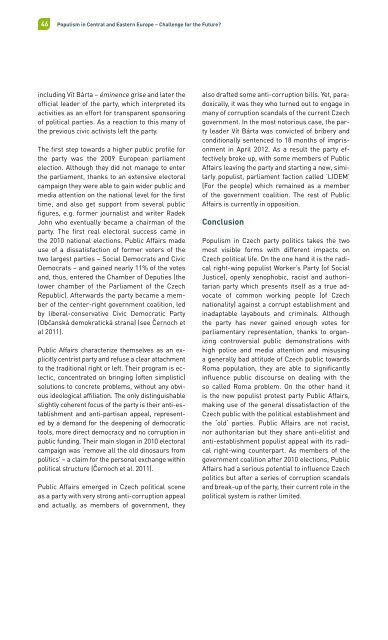Populism in Central and Eastern Europe â Challenge for the Future?
Populism in Central and Eastern Europe â Challenge for the Future?
Populism in Central and Eastern Europe â Challenge for the Future?
- No tags were found...
Create successful ePaper yourself
Turn your PDF publications into a flip-book with our unique Google optimized e-Paper software.
46 <strong>Populism</strong> <strong>in</strong> <strong>Central</strong> <strong>and</strong> <strong>Eastern</strong> <strong>Europe</strong> – <strong>Challenge</strong> <strong>for</strong> <strong>the</strong> <strong>Future</strong><br />
<strong>in</strong>clud<strong>in</strong>g Vít Bárta – ém<strong>in</strong>ence grise <strong>and</strong> later <strong>the</strong><br />
official leader of <strong>the</strong> party, which <strong>in</strong>terpreted its<br />
activities as an ef<strong>for</strong>t <strong>for</strong> transparent sponsor<strong>in</strong>g<br />
of political parties. As a reaction to this many of<br />
<strong>the</strong> previous civic activists left <strong>the</strong> party.<br />
The first step towards a higher public profile <strong>for</strong><br />
<strong>the</strong> party was <strong>the</strong> 2009 <strong>Europe</strong>an parliament<br />
election. Although <strong>the</strong>y did not manage to enter<br />
<strong>the</strong> parliament, thanks to an extensive electoral<br />
campaign <strong>the</strong>y were able to ga<strong>in</strong> wider public <strong>and</strong><br />
media attention on <strong>the</strong> national level <strong>for</strong> <strong>the</strong> first<br />
time, <strong>and</strong> also get support from several public<br />
figures, e.g. <strong>for</strong>mer journalist <strong>and</strong> writer Radek<br />
John who eventually became a chairman of <strong>the</strong><br />
party. The first real electoral success came <strong>in</strong><br />
<strong>the</strong> 2010 national elections. Public Affairs made<br />
use of a dissatisfaction of <strong>for</strong>mer voters of <strong>the</strong><br />
two largest parties – Social Democrats <strong>and</strong> Civic<br />
Democrats – <strong>and</strong> ga<strong>in</strong>ed nearly 11% of <strong>the</strong> votes<br />
<strong>and</strong>, thus, entered <strong>the</strong> Chamber of Deputies (<strong>the</strong><br />
lower chamber of <strong>the</strong> Parliament of <strong>the</strong> Czech<br />
Republic). Afterwards <strong>the</strong> party became a member<br />
of <strong>the</strong> center-right government coalition, led<br />
by liberal-conservative Civic Democratic Party<br />
(Občanská demokratická strana) (see Černoch et<br />
al 2011).<br />
Public Affairs characterize <strong>the</strong>mselves as an explicitly<br />
centrist party <strong>and</strong> refuse a clear attachment<br />
to <strong>the</strong> traditional right or left. Their program is eclectic,<br />
concentrated on br<strong>in</strong>g<strong>in</strong>g (often simplistic)<br />
solutions to concrete problems, without any obvious<br />
ideological affiliation. The only dist<strong>in</strong>guishable<br />
slightly coherent focus of <strong>the</strong> party is <strong>the</strong>ir anti-establishment<br />
<strong>and</strong> anti-partisan appeal, represented<br />
by a dem<strong>and</strong> <strong>for</strong> <strong>the</strong> deepen<strong>in</strong>g of democratic<br />
tools, more direct democracy <strong>and</strong> no corruption <strong>in</strong><br />
public fund<strong>in</strong>g. Their ma<strong>in</strong> slogan <strong>in</strong> 2010 electoral<br />
campaign was ‘remove all <strong>the</strong> old d<strong>in</strong>osaurs from<br />
politics’ – a claim <strong>for</strong> <strong>the</strong> personal exchange with<strong>in</strong><br />
political structure (Černoch et al. 2011).<br />
Public Affairs emerged <strong>in</strong> Czech political scene<br />
as a party with very strong anti-corruption appeal<br />
<strong>and</strong> actually, as members of government, <strong>the</strong>y<br />
also drafted some anti-corruption bills. Yet, paradoxically,<br />
it was <strong>the</strong>y who turned out to engage <strong>in</strong><br />
many of corruption sc<strong>and</strong>als of <strong>the</strong> current Czech<br />
government. In <strong>the</strong> most notorious case, <strong>the</strong> party<br />
leader Vít Bárta was convicted of bribery <strong>and</strong><br />
conditionally sentenced to 18 months of imprisonment<br />
<strong>in</strong> April 2012. As a result <strong>the</strong> party effectively<br />
broke up, with some members of Public<br />
Affairs leav<strong>in</strong>g <strong>the</strong> party <strong>and</strong> start<strong>in</strong>g a new, similarly<br />
populist, parliament faction called ‘LIDEM’<br />
(For <strong>the</strong> people) which rema<strong>in</strong>ed as a member<br />
of <strong>the</strong> government coalition. The rest of Public<br />
Affairs is currently <strong>in</strong> opposition.<br />
Conclusion<br />
<strong>Populism</strong> <strong>in</strong> Czech party politics takes <strong>the</strong> two<br />
most visible <strong>for</strong>ms with different impacts on<br />
Czech political life. On <strong>the</strong> one h<strong>and</strong> it is <strong>the</strong> radical<br />
right-w<strong>in</strong>g populist Worker’s Party (of Social<br />
Justice), openly xenophobic, racist <strong>and</strong> authoritarian<br />
party which presents itself as a true advocate<br />
of common work<strong>in</strong>g people (of Czech<br />
nationality) aga<strong>in</strong>st a corrupt establishment <strong>and</strong><br />
<strong>in</strong>adaptable layabouts <strong>and</strong> crim<strong>in</strong>als. Although<br />
<strong>the</strong> party has never ga<strong>in</strong>ed enough votes <strong>for</strong><br />
parliamentary representation, thanks to organiz<strong>in</strong>g<br />
controversial public demonstrations with<br />
high police <strong>and</strong> media attention <strong>and</strong> misus<strong>in</strong>g<br />
a generally bad attitude of Czech public towards<br />
Roma population, <strong>the</strong>y are able to significantly<br />
<strong>in</strong>fluence public discourse on deal<strong>in</strong>g with <strong>the</strong><br />
so called Roma problem. On <strong>the</strong> o<strong>the</strong>r h<strong>and</strong> it<br />
is <strong>the</strong> new populist protest party Public Affairs,<br />
mak<strong>in</strong>g use of <strong>the</strong> general dissatisfaction of <strong>the</strong><br />
Czech public with <strong>the</strong> political establishment <strong>and</strong><br />
<strong>the</strong> ‘old‘ parties. Public Affairs are not racist,<br />
nor authoritarian but <strong>the</strong>y share anti-elitist <strong>and</strong><br />
anti-establishment populist appeal with its radical<br />
right-w<strong>in</strong>g counterpart. As members of <strong>the</strong><br />
government coalition after 2010 elections, Public<br />
Affairs had a serious potential to <strong>in</strong>fluence Czech<br />
politics but after a series of corruption sc<strong>and</strong>als<br />
<strong>and</strong> break-up of <strong>the</strong> party, <strong>the</strong>ir current role <strong>in</strong> <strong>the</strong><br />
political system is ra<strong>the</strong>r limited.










